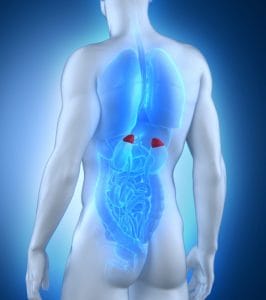
What is DHEAs?
DHEA is the short form for the hormone Dehydroepiandrosterone. It is a weak androgen or male-type hormone. DHEAs is the same hormone with a sulfate group stuck to it. 98% of the DHEA in your blood is in the form of DHEAs.
DHEA is a building block to turn into other hormones, like androstenedione, which can then be used to make testosterone, which can then be used to make estrogen.
Under direction from a gland in your brain known as your pituitary gland, most of this hormone (75-90%) is produced in your adrenal glands, with smaller amounts made in your reproductive organs and brain.
DHEA has many impacts on the body. It affects the lining of your blood vessels, reduces inflammation, improves insulin sensitivity, helps blood flow, cellular immunity, body composition, bone metabolism, sexual function, and physical strength. It also protects the nervous system, improves cognitive function, and enhances memory.
You can see why having the right amount of this hormone is essential!
What Causes Low DHEAs?
DHEAs levels decline with age, so sometimes low DHEAs is just an age thing. A low level may be normal for a man or woman in their 80s; however, we wouldn’t expect that in someone in their 30s. We have to interpret blood results according to what is normal for the person’s age and gender.
Symptoms of Low DHEAs
Low levels of DHEAs may also occur if your pituitary gland isn’t working well, in severe adrenal gland insufficiency disease (Addison’s), and when people are on corticosteroid therapy or under high stress levels.
Symptoms of low levels of DHEAs in women include fatigue, depression, anxiety, hypersensitivity to noise, loss of libido, dry eyes, skin, and hair, and loss of head, underarm, and pubic hair.
How Can You Increase DHEAs Naturally?
Since a substantial amount of DHEAs comes from your adrenal glands, sometimes low levels indicate that they are not functioning well. Your adrenal glands are your stress glands. They are what helps you deal with stress. They are an essential part of your hormone-producing, or endocrine, system. They sit just on top of your kidneys. They require copious amounts of vitamin C, B5, B6, magnesium, and zinc to work well. Under conditions of chronic stress, these vitamins and minerals may become depleted. Then your adrenals can’t work correctly to produce the hormones that they are supposed to. Supplementation with vitamin B5, B6, C, zinc, and magnesium may be helpful.
Sometimes, the adrenal glands don’t provide the right levels of DHEAs because they aren’t getting the right information from the pituitary gland. This is called HPA axis dysfunction. Support for the pituitary gland requires similar vitamins and minerals as your adrenal glands, particularly vitamin B6 and magnesium.
Addison’s disease, adrenal gland insufficiency, may require adrenal hormone replacement, including DHEA.
In adrenal suppression due to corticosteroid therapy, dosage adjustment may allow levels of DHEA to rebound.
Because stress increases your body’s internal corticosteroid production, moderating your stress levels and using cortisol-modulating adaptogenic herbs like ginseng, Ashwagandha, Rhodiola, or Schisandra may also allow DHEAs to return to normal.
What Causes High DHEAs?
High DHEAs can also be a byproduct of a pituitary gland growth that is secreting too much ACTH (Cushing’s disease). Determining if this is the case requires measuring the blood level of cortisol and a 24-hour urine cortisol measurement.
Elevated levels of DHEAs are also related to insulin resistance. Insulin resistance occurs when the body makes extra insulin in response to foods that require it. This is sometimes the cause of high DHEAs in women with PCOS.
Insulin promotes excessive DHEA production from your ovaries/testes and adrenal glands.
What are the Symptoms of High DHEAs?
Increased levels of DHEAs can cause several symptoms like acne, head hair loss, irregular periods, infertility, genital abnormalities, depression, deeper voice, PCOS (polycystic ovarian syndrome), and excessive body or facial hair growth in women.
How Do You Decrease DHEAs?
Making some dietary changes and introducing moderate exercise may reduce insulin sufficiently to help your DHEAs come back to the optimal range. Our goal is to lower insulin, so cutting back on insulin-provoking foods like carbs and sugar reduces the need for your body to make insulin.
A healthy diet for someone like this would mean lots of vegetables (6-8 servings per day), moderate fruit (1-2 servings per day), moderate protein (1-2 servings per day), healthy fats from nuts and seeds (1-2 servings per day) and whole, unprocessed grains (0-1 servings per day).
High-intensity interval Training has been proven particularly effective for lowering insulin levels. Adding stress-reducing exercises like yoga and cardiovascular exercise may also help.
What if the Lab Range Says My DHEAs is Normal, but I Have Low or High DHEAs Symptoms?
Be aware that lab ranges are not based on what is “ideal” or “optimal” for any test. They are averages of whoever the lab has been testing. Often, the people that the lab is testing for hormones are people who have obvious signs of a hormonal problem. It may be that you are too close to the upper or lower limit of the range, and for you, that is enough to trigger symptoms. It may also be that a different hormonal imbalance causes the problems that you are experiencing. Low or high testosterone would cause similar symptoms as low or high DHEAs, for example.
If you need help with your DHEAs levels, adrenal glands, or any other hormone issue, book an appointment or call me at 416-481-0222. I can give you tailored advice in person or virtually if you are anywhere in Ontario. If you are elsewhere, I can’t provide personalized treatment, but you can get general information about natural approaches for PCOS in my ebook here.
Authored by Dr. Pamela Frank, BSc(Hons), ND
Dr. Pamela has practiced as a naturopathic doctor in Toronto since 1999. She has received numerous “Best Naturopath in Toronto” awards. She is registered with the College of Naturopaths of Ontario.
Dr. Pamela Frank uses a natural treatment approach that may include acupuncture, herbal medicine, nutrition, diet, vitamins, supplements, and other natural remedies to restore balance and provide long-term resolution to almost any health problem.
DHEAs Research
Klinge CM, Clark BJ, Prough RA. Dehydroepiandrosterone Research: Past, Current, and Future. Vitam Horm. 2018;108:1-28. doi: 10.1016/bs.vh.2018.02.002. Epub 2018 Mar 16. PMID: 30029723.
Goodarzi MO, Carmina E, Azziz R. DHEA, DHEAS, and PCOS. J Steroid Biochem Mol Biol. 2015 Jan;145:213-25. doi: 10.1016/j.jsbmb.2014.06.003. Epub 2014 Jul 5. PMID: 25008465.
